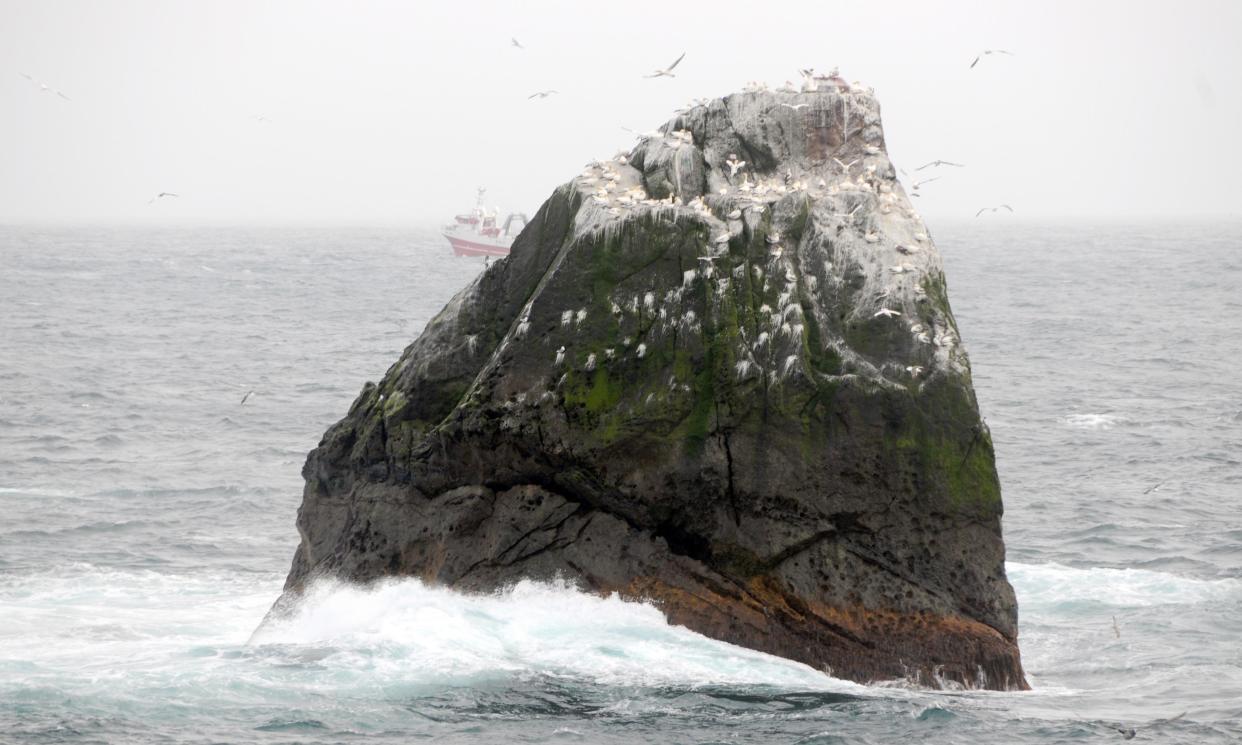Rockall fishing rights dispute between Scotland and Ireland deepens

Irish fisheries leaders have warned of fresh conflicts with Scotland over fishing rights around the north Atlantic islet of Rockall as evidence emerged about the roots of the long-running sovereignty dispute.
Scotland and Ireland have been at loggerheads over access to fishing grounds within 12 nautical miles of Rockall since the Brexit referendum in 2016, which signalled an end to the UK’s membership of the common fisheries policy.
Scottish fishery protection vessels have intercepted and boarded Irish trawlers caught fishing for squid and haddock around the uninhabited islet, with skippers facing arrest and a ban from fishing in British waters if they are caught.
The crisis abated in early 2021 after the EU signed the Brexit agreement with Boris Johnson’s government. That confirmed the UK’s rights to restrict access to British coastal waters – a measure that Scottish ministers are enforcing around Rockall.
Irish fisheries leaders say they are ready to rekindle the dispute unless ministers in Edinburgh agree to reopen Rockall’s waters. Scottish officials said they were hopeful a deal might soon be struck to resolve the conflict.
Sinn Féin’s fisheries spokesperson, Padraig Mac Lochlainn, told the Guardian that the UK’s restrictions around Rockall cost Irish trawlers an estimated €7m (£6m) a year. “The Irish fishing industry suffered grievously under Brexit and this is rubbing salt in the wounds,” he said.
If Sinn Féin takes power in Dublin – opinion polls say it is positioned to lead the next Irish government – it will be “much more forceful” in asserting Irish rights, Mac Lochlainn said. “We would make one last effort to resolve this [diplomatically] and then go to international arbitration.”
Rockall became a serious diplomatic problem for the then leader Nicola Sturgeon’s nationalist government in Edinburgh in 2019, threatening to undermine her attempts to win support overseas for a fresh independence referendum and a Scottish application to rejoin the EU.
Although protecting the UK’s territory is a matter for the Westminster government, responsibility for Scotland’s fisheries is devolved to the Scottish parliament.
The Scottish government has been forced to release confidential letters and other heavily redacted documents about the crisis by the Scottish information commissioner after a three-year transparency dispute with the Guardian.
The origins of the Rockall dispute
A small, uninhabited granite islet sitting deep in the Atlantic, Rockall has been the focus of repeated attempts by adventurers to set new occupation records, who hope to defy the harsh storms. It is also the centre of an unresolved dispute about sovereignty.
Sitting 230 miles west of the Outer Hebrides, it was claimed for the UK by the Royal Navy in 1955, greatly extending the UK’s exclusive economic zone. That soon triggered protests from Ireland, Denmark and Iceland, who accused the UK of breaching international treaties, particularly the UN law of the sea convention (Unclos).
According to Unclos, "rocks which cannot sustain human habitation or economic life of their own shall have no exclusive economic zone or continental shelf".
This matters deeply to Irish fishers. Rockall’s rich waters attract squid and haddock. If the UK rightfully owns Rockall, it is allowed to control access to territorial waters within 12 nautical miles of the rock – a power that severely restricts other nations’ rights to fish there.
Severin Carrell and Rory Carroll
They show Sturgeon tried repeatedly to resolve the Rockall “difficulties” because Ireland was seen as a key ally for Scotland within the EU. The crisis often topped the agenda in her meetings with the successive taoiseachs Micheál Martin and Leo Varadkar and talks involving other ministers.
The documents show the dispute erupted in September 2018 when Fiona Hyslop, then Scotland’s external affairs secretary, wrote to Simon Coveney, then Ireland’s foreign minister, and appeared to accuse the Irish of reneging on an undertaking to stop its trawlers from fishing around Rockall.
The letter recounts how both sides had an informal agreement in April 2017 to suspend enforcement action against Irish trawlers. But “regrettably” Irish vessels were still fishing around Rockall despite “a number of meetings and conversations between our respective teams” and Scottish offers of “creative solutions” to the dispute.
“I believe that the Scottish government has shown considerable patience during the preceding 18-month period,” Hyslop told Coveney. “[However] the continued high level of fishing by Irish vessels in the UK’s territorial sea around Rockall and the lack of progress in our bilateral conversations mean that is now time for us to take action.”
If Irish trawlers strayed within 12 miles of Rockall they would be intercepted by unarmed fisheries protection vessels, she said. In May 2019, she wrote to Coveney to warn him those interceptions would resume within a week.
Hyslop and Scotland’s rural economy secretary, Fergus Ewing, were regarded as hawks on this issue and the dispute overshadowed another significant question about Rockall’s future.
Senior sources say that if Scotland had become independent and applied to rejoin the EU, Scottish ministers were ready to negotiate access to Rockall’s waters in order to rejoin the common fisheries policy. It is understood that was made clear by Sturgeon to Irish leaders.
“If this is about waving the Scottish flag, fair enough, but then don’t be coming to us looking for favours when you want to enter Europe,” said Patrick Murphy, the head of the Irish South and West Producers Organisation. “If you want friends in Europe then you have to act like friends.”
A Scottish government spokesperson said it had been “consistently clear” about Rockall’s status, but added: “There have been developments in recent months which increase our confidence that arrangements can be agreed under the Scottish/Irish bilateral framework which will be satisfactory for both sides.”
A spokesperson for Ireland’s department of foreign affairs concurred. “The relevant Irish, Scottish and UK authorities continue to engage constructively on this matter, and we hope that a resolution – which is in all of our mutual interests – can be found to the issues involved,” they said.

 Yahoo News
Yahoo News 
